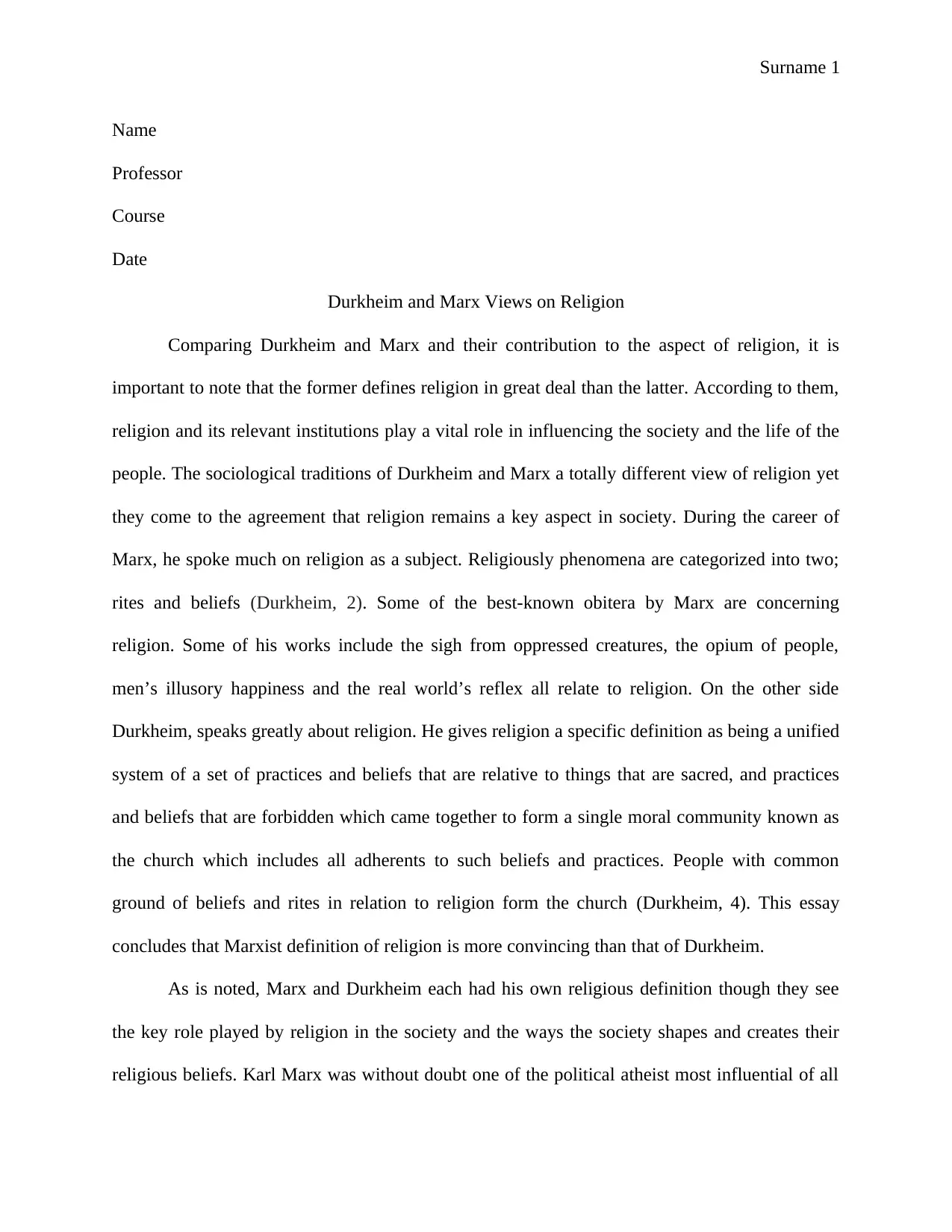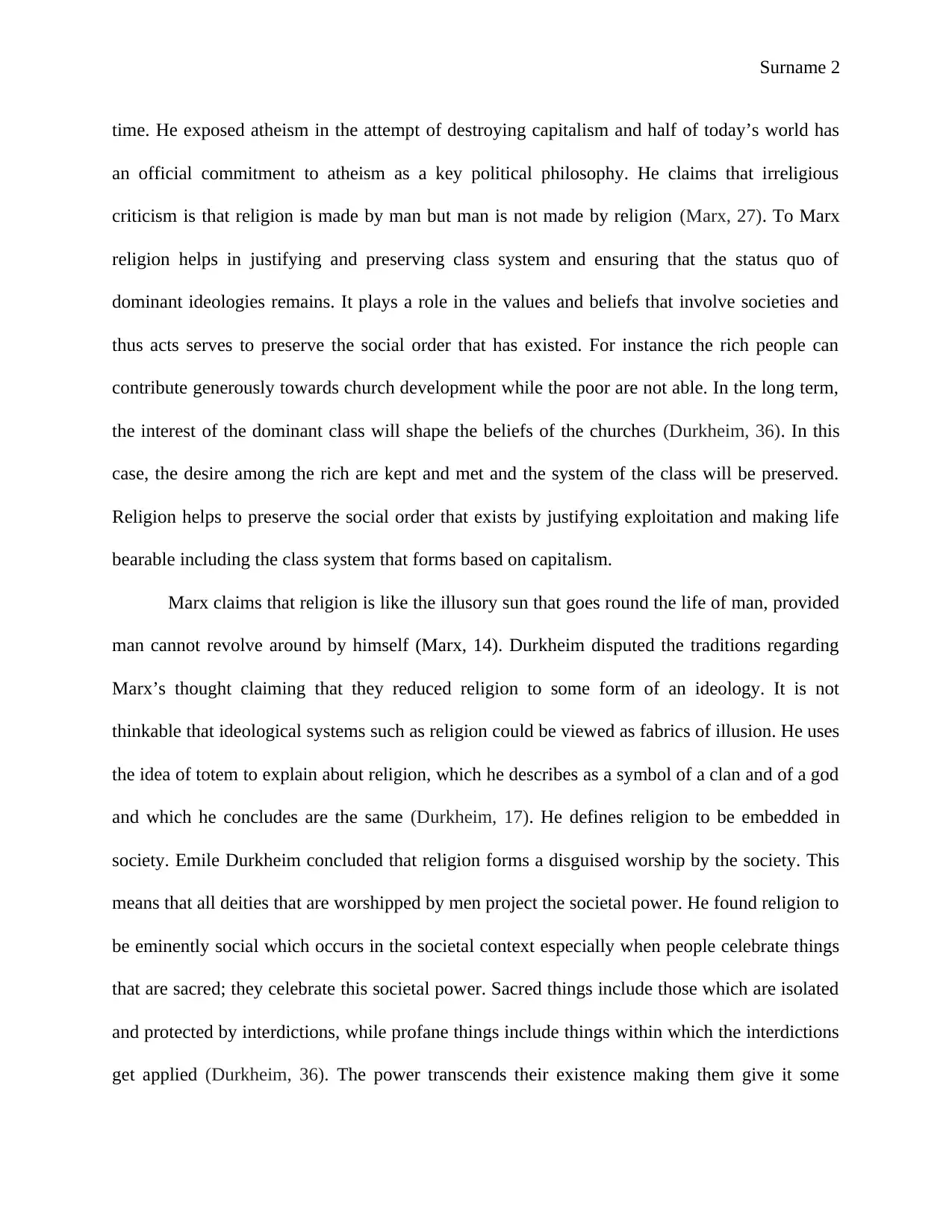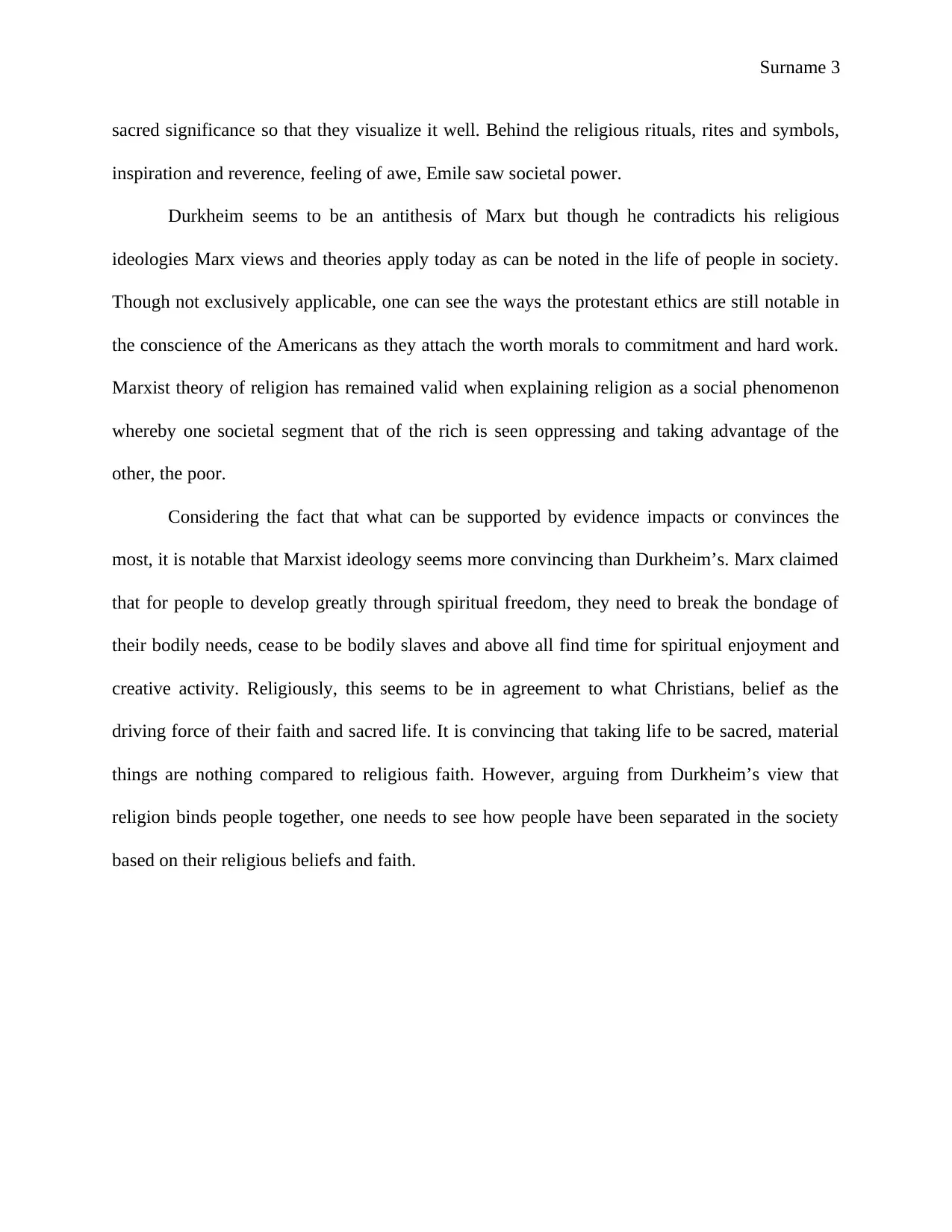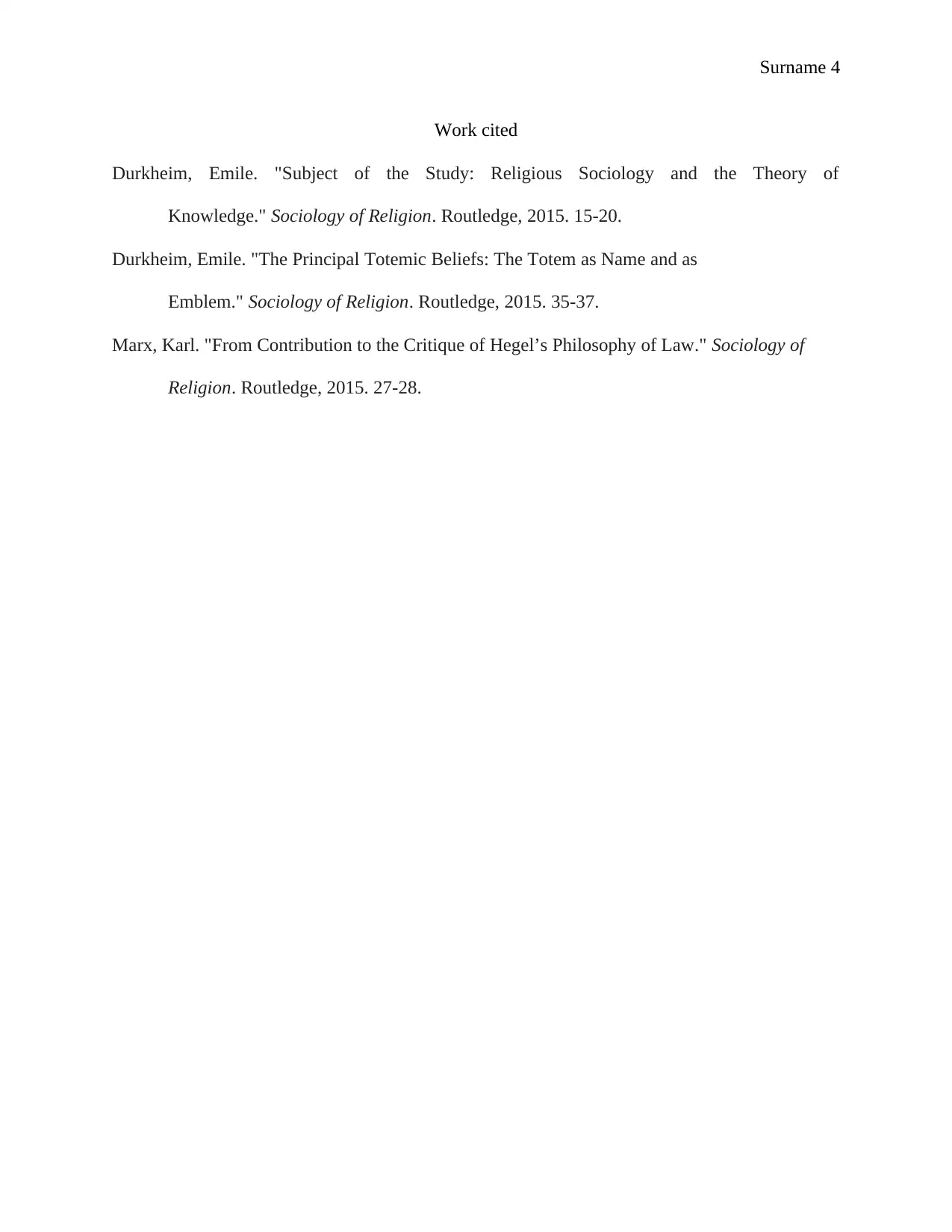Sociological Analysis: Durkheim and Marx's Theories on Religion
VerifiedAdded on 2022/11/14
|4
|1097
|155
Essay
AI Summary
This essay provides a comparative analysis of Émile Durkheim and Karl Marx's perspectives on religion. It highlights Durkheim's definition of religion as a unified system of beliefs and practices centered on the sacred, emphasizing its role in creating social cohesion, in contrast to Marx's view of religion as a tool used to justify class systems and maintain the status quo. The essay explores their differing views on the societal impact of religion, with Marx seeing it as a form of social control, while Durkheim views it as a reflection of society itself. It then goes on to evaluate which viewpoint is more convincing, concluding with a discussion on the validity of Marx's and Durkheim's theories in modern society. The essay uses the concepts of the totem and the protestant ethics to support its arguments, and the validity of both theories is discussed in the context of the modern world.

Surname 1
Name
Professor
Course
Date
Durkheim and Marx Views on Religion
Comparing Durkheim and Marx and their contribution to the aspect of religion, it is
important to note that the former defines religion in great deal than the latter. According to them,
religion and its relevant institutions play a vital role in influencing the society and the life of the
people. The sociological traditions of Durkheim and Marx a totally different view of religion yet
they come to the agreement that religion remains a key aspect in society. During the career of
Marx, he spoke much on religion as a subject. Religiously phenomena are categorized into two;
rites and beliefs (Durkheim, 2). Some of the best-known obitera by Marx are concerning
religion. Some of his works include the sigh from oppressed creatures, the opium of people,
men’s illusory happiness and the real world’s reflex all relate to religion. On the other side
Durkheim, speaks greatly about religion. He gives religion a specific definition as being a unified
system of a set of practices and beliefs that are relative to things that are sacred, and practices
and beliefs that are forbidden which came together to form a single moral community known as
the church which includes all adherents to such beliefs and practices. People with common
ground of beliefs and rites in relation to religion form the church (Durkheim, 4). This essay
concludes that Marxist definition of religion is more convincing than that of Durkheim.
As is noted, Marx and Durkheim each had his own religious definition though they see
the key role played by religion in the society and the ways the society shapes and creates their
religious beliefs. Karl Marx was without doubt one of the political atheist most influential of all
Name
Professor
Course
Date
Durkheim and Marx Views on Religion
Comparing Durkheim and Marx and their contribution to the aspect of religion, it is
important to note that the former defines religion in great deal than the latter. According to them,
religion and its relevant institutions play a vital role in influencing the society and the life of the
people. The sociological traditions of Durkheim and Marx a totally different view of religion yet
they come to the agreement that religion remains a key aspect in society. During the career of
Marx, he spoke much on religion as a subject. Religiously phenomena are categorized into two;
rites and beliefs (Durkheim, 2). Some of the best-known obitera by Marx are concerning
religion. Some of his works include the sigh from oppressed creatures, the opium of people,
men’s illusory happiness and the real world’s reflex all relate to religion. On the other side
Durkheim, speaks greatly about religion. He gives religion a specific definition as being a unified
system of a set of practices and beliefs that are relative to things that are sacred, and practices
and beliefs that are forbidden which came together to form a single moral community known as
the church which includes all adherents to such beliefs and practices. People with common
ground of beliefs and rites in relation to religion form the church (Durkheim, 4). This essay
concludes that Marxist definition of religion is more convincing than that of Durkheim.
As is noted, Marx and Durkheim each had his own religious definition though they see
the key role played by religion in the society and the ways the society shapes and creates their
religious beliefs. Karl Marx was without doubt one of the political atheist most influential of all
Paraphrase This Document
Need a fresh take? Get an instant paraphrase of this document with our AI Paraphraser

Surname 2
time. He exposed atheism in the attempt of destroying capitalism and half of today’s world has
an official commitment to atheism as a key political philosophy. He claims that irreligious
criticism is that religion is made by man but man is not made by religion (Marx, 27). To Marx
religion helps in justifying and preserving class system and ensuring that the status quo of
dominant ideologies remains. It plays a role in the values and beliefs that involve societies and
thus acts serves to preserve the social order that has existed. For instance the rich people can
contribute generously towards church development while the poor are not able. In the long term,
the interest of the dominant class will shape the beliefs of the churches (Durkheim, 36). In this
case, the desire among the rich are kept and met and the system of the class will be preserved.
Religion helps to preserve the social order that exists by justifying exploitation and making life
bearable including the class system that forms based on capitalism.
Marx claims that religion is like the illusory sun that goes round the life of man, provided
man cannot revolve around by himself (Marx, 14). Durkheim disputed the traditions regarding
Marx’s thought claiming that they reduced religion to some form of an ideology. It is not
thinkable that ideological systems such as religion could be viewed as fabrics of illusion. He uses
the idea of totem to explain about religion, which he describes as a symbol of a clan and of a god
and which he concludes are the same (Durkheim, 17). He defines religion to be embedded in
society. Emile Durkheim concluded that religion forms a disguised worship by the society. This
means that all deities that are worshipped by men project the societal power. He found religion to
be eminently social which occurs in the societal context especially when people celebrate things
that are sacred; they celebrate this societal power. Sacred things include those which are isolated
and protected by interdictions, while profane things include things within which the interdictions
get applied (Durkheim, 36). The power transcends their existence making them give it some
time. He exposed atheism in the attempt of destroying capitalism and half of today’s world has
an official commitment to atheism as a key political philosophy. He claims that irreligious
criticism is that religion is made by man but man is not made by religion (Marx, 27). To Marx
religion helps in justifying and preserving class system and ensuring that the status quo of
dominant ideologies remains. It plays a role in the values and beliefs that involve societies and
thus acts serves to preserve the social order that has existed. For instance the rich people can
contribute generously towards church development while the poor are not able. In the long term,
the interest of the dominant class will shape the beliefs of the churches (Durkheim, 36). In this
case, the desire among the rich are kept and met and the system of the class will be preserved.
Religion helps to preserve the social order that exists by justifying exploitation and making life
bearable including the class system that forms based on capitalism.
Marx claims that religion is like the illusory sun that goes round the life of man, provided
man cannot revolve around by himself (Marx, 14). Durkheim disputed the traditions regarding
Marx’s thought claiming that they reduced religion to some form of an ideology. It is not
thinkable that ideological systems such as religion could be viewed as fabrics of illusion. He uses
the idea of totem to explain about religion, which he describes as a symbol of a clan and of a god
and which he concludes are the same (Durkheim, 17). He defines religion to be embedded in
society. Emile Durkheim concluded that religion forms a disguised worship by the society. This
means that all deities that are worshipped by men project the societal power. He found religion to
be eminently social which occurs in the societal context especially when people celebrate things
that are sacred; they celebrate this societal power. Sacred things include those which are isolated
and protected by interdictions, while profane things include things within which the interdictions
get applied (Durkheim, 36). The power transcends their existence making them give it some

Surname 3
sacred significance so that they visualize it well. Behind the religious rituals, rites and symbols,
inspiration and reverence, feeling of awe, Emile saw societal power.
Durkheim seems to be an antithesis of Marx but though he contradicts his religious
ideologies Marx views and theories apply today as can be noted in the life of people in society.
Though not exclusively applicable, one can see the ways the protestant ethics are still notable in
the conscience of the Americans as they attach the worth morals to commitment and hard work.
Marxist theory of religion has remained valid when explaining religion as a social phenomenon
whereby one societal segment that of the rich is seen oppressing and taking advantage of the
other, the poor.
Considering the fact that what can be supported by evidence impacts or convinces the
most, it is notable that Marxist ideology seems more convincing than Durkheim’s. Marx claimed
that for people to develop greatly through spiritual freedom, they need to break the bondage of
their bodily needs, cease to be bodily slaves and above all find time for spiritual enjoyment and
creative activity. Religiously, this seems to be in agreement to what Christians, belief as the
driving force of their faith and sacred life. It is convincing that taking life to be sacred, material
things are nothing compared to religious faith. However, arguing from Durkheim’s view that
religion binds people together, one needs to see how people have been separated in the society
based on their religious beliefs and faith.
sacred significance so that they visualize it well. Behind the religious rituals, rites and symbols,
inspiration and reverence, feeling of awe, Emile saw societal power.
Durkheim seems to be an antithesis of Marx but though he contradicts his religious
ideologies Marx views and theories apply today as can be noted in the life of people in society.
Though not exclusively applicable, one can see the ways the protestant ethics are still notable in
the conscience of the Americans as they attach the worth morals to commitment and hard work.
Marxist theory of religion has remained valid when explaining religion as a social phenomenon
whereby one societal segment that of the rich is seen oppressing and taking advantage of the
other, the poor.
Considering the fact that what can be supported by evidence impacts or convinces the
most, it is notable that Marxist ideology seems more convincing than Durkheim’s. Marx claimed
that for people to develop greatly through spiritual freedom, they need to break the bondage of
their bodily needs, cease to be bodily slaves and above all find time for spiritual enjoyment and
creative activity. Religiously, this seems to be in agreement to what Christians, belief as the
driving force of their faith and sacred life. It is convincing that taking life to be sacred, material
things are nothing compared to religious faith. However, arguing from Durkheim’s view that
religion binds people together, one needs to see how people have been separated in the society
based on their religious beliefs and faith.
⊘ This is a preview!⊘
Do you want full access?
Subscribe today to unlock all pages.

Trusted by 1+ million students worldwide

Surname 4
Work cited
Durkheim, Emile. "Subject of the Study: Religious Sociology and the Theory of
Knowledge." Sociology of Religion. Routledge, 2015. 15-20.
Durkheim, Emile. "The Principal Totemic Beliefs: The Totem as Name and as
Emblem." Sociology of Religion. Routledge, 2015. 35-37.
Marx, Karl. "From Contribution to the Critique of Hegel’s Philosophy of Law." Sociology of
Religion. Routledge, 2015. 27-28.
Work cited
Durkheim, Emile. "Subject of the Study: Religious Sociology and the Theory of
Knowledge." Sociology of Religion. Routledge, 2015. 15-20.
Durkheim, Emile. "The Principal Totemic Beliefs: The Totem as Name and as
Emblem." Sociology of Religion. Routledge, 2015. 35-37.
Marx, Karl. "From Contribution to the Critique of Hegel’s Philosophy of Law." Sociology of
Religion. Routledge, 2015. 27-28.
1 out of 4
Your All-in-One AI-Powered Toolkit for Academic Success.
+13062052269
info@desklib.com
Available 24*7 on WhatsApp / Email
![[object Object]](/_next/static/media/star-bottom.7253800d.svg)
Unlock your academic potential
Copyright © 2020–2025 A2Z Services. All Rights Reserved. Developed and managed by ZUCOL.


